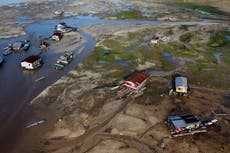World can breathe sigh of relief for climate after Bolsonaro’s election defeat
Environmental momentum receives critical boost days before UN’s Cop27 climate summit, writes Harry Cockburn


The defeat of the deforestation king Jair Bolsonaro will be a relief to climate campaigners as environmentally friendly governance is back on the table in Brazil.
In a stunning political comeback, and after being jailed in 2018 ahead of Mr Bolsonaro’s election, former president Luiz Inacio Lula da Silva overturned what many had thought was a foregone conclusion to return to office.
Under the Bolsonaro administration, destruction of the Amazon has surged, doubling CO2 emissions from wildfires between 2019 and 2020 and with deforestation reaching a 15-year high in 2021.
His unwavering support of enormous agricultural conglomerates razing the rainforest for beef and soy production led to the hollowing out of Brazil’s environmental agencies, allowed illegal mining and logging to thrive – resulting in murderous impacts on indigenous peoples in the forest – and made Brazil an international pariah on the world stage.
As Brazil’s own National Institute for Space Research (INPE) warned about the soaring level of deforestation under Bolsonaro, the government responded by firing the head of the institute and describing the level of fires – used to clear land – as a “lie”.
Analysis suggests the end of Mr Bolsonaro’s presidency could see deforestation rates now plummet by almost 90 per cent.
“Let’s fight for zero deforestation,” Lula said in his first speech as president-elect.
“Brazil is ready to resume its leading role in the fight against the climate crisis, protecting all our biomes, especially the Amazon Forest.
“Brazil will fight for a living Amazon; a standing tree is worth more than thousands of logs. That is why we will resume the surveillance of the entire Amazon and any illegal activity, and at the same time we will promote sustainable development.”
The global importance of the planet’s largest rainforest cannot be understated. Popularly known as the “lungs of the world”, the forest cleans the air we breathe, stores around 76 billion tonnes of carbon in total, and releases 20 billion tonnes of water into the atmosphere each day.
The intense level of biodiversity in the forest means it is home to one in 10 known species living on land, despite covering less than 1 per cent of the Earth’s surface.
But since the 1960s, decades of deforestation have upended the previously self-regulating ecological and hydrological systems critical to ensuring the forest’s survival.
Last year, the forest officially emitted more carbon than it absorbed – flipping its status as a global carbon sink to an enormous carbon source, worsening the climate crisis.
Despite Bolsonaro’s slash-and-burn bonanza, Brazil still has a hallowed place in the environment movement’s history. It was at the end of the Cold War in 1992, that representatives from countries across the world came together for the UN’s “Earth Summit” in Rio de Janeiro which paved the way for international cooperation on tackling environmental issues.
At the UN’s Cop26 summit in Glasgow this time last year, 100 world leaders pledged to end and reverse global deforestation by 2030. Brazil was among the signatories, but deforestation has risen 76 per cent since 2021 so far this year.
As this year’s summit in Egypt opens next week, the return of Lula and a determined, pro-environmental government in Brazil is a sorely needed boost.
Harry Cockburn is an environment correspondent at The Independent
Join our commenting forum
Join thought-provoking conversations, follow other Independent readers and see their replies
Comments



Bookmark popover
Removed from bookmarks